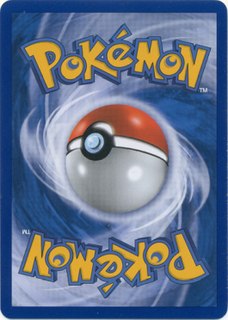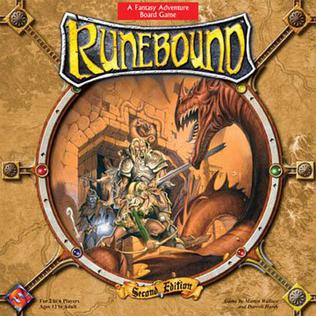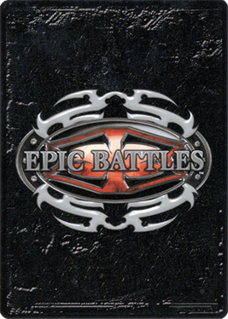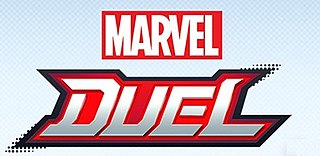
The Pokémon Trading Card Game, abbreviated to PTCG or Pokémon TCG, is a collectible card game based on the Pokémon franchise by Nintendo. It was first published in October 1996 by Media Factory in Japan. In the US, it was initially published by Wizards of the Coast; Nintendo eventually transferred the rights to The Pokémon Company which has published the game since June 2003. As of March 2021, the game has sold over 34.1 billion cards worldwide.

The Yu-Gi-Oh! Trading Card Game is a Japanese collectible card game developed and published by Konami. It is based on the fictional game of Duel Monsters created by manga artist Kazuki Takahashi, which appears in portions of the manga franchise Yu-Gi-Oh!, and is the central plot device throughout its various anime adaptations and spinoff series.

The Yu Yu Hakusho Trading Card Game was first published in 2003 by Score Entertainment, and is based on the anime and manga series YuYu Hakusho. It is a two-player tournament-styled collectible card game; each player uses a deck of forty-four or more cards that is headed by a team of four character cards. The game was discontinued in 2005.

OverPower is an out-of-print collectible card game produced by Fleer Corporation originally featuring characters from Marvel Comics and later from DC Comics and Image Comics. The game was initially launched in August 1995. In the game, two players went head-to-head with teams of four heroes and villains. Unlike most other collectible card games of the mid-1990s, OverPower was very distinct strategically and structurally different from Magic: The Gathering.
Speed is a game for two players or more of the shedding family of card games, in which each player tries to get rid of all of their cards first.
Myths and Legends is a collectible card game based on universal mythologies, developed in 2000 in Santiago, Chile. The game currently counts with 39 sets and over 3000 different cards. It is the only collectible card game fully produced and developed in Latin-America, with some expansions translated into the English and German languages. The game was released in Europe, United States, Oceania and Latin America. In January 2010, the game went into "indefinite recess" due to the bankruptcy of the publisher, Salo. In October 2014 the game was officially brought back to print with the release of Furia, a 190-card expansion that saw the return of many of the original artists to the game.
The Universal Fighting System (UFS) is a collectible card game designed by Jasco Games. Games of UFS represent a fight between two characters in hand-to-hand combat. Characters are drawn from original properties as well as a number of licensed ones, such as Mega Man, Street Fighter, The King of Fighters XIII and Darkstalkers. The sets are cross-compatible – cards from multiple licenses can be included in the same deck, and characters from different universes may face each other in a match.

The Robotech Collectible Card Game (CCG) is an out-of-print collectible card game produced by Hero Factory that is set against the science fiction backdrop of Robotech. Cards are based on characters and mecha from this popular anime. After a limited public beta testing period, the game debuted at Anime Expo in 2006.

Avatar: The Last Airbender Trading Card Game is an out-of-print collectible card game based on the Nickelodeon animated television series Avatar: The Last Airbender. Upper Deck Entertainment launched this title in the first quarter of 2006.
The Conan Collectible Card Game is an out-of-print collectible card game set in the fictional Hyborian Age of Conan the Barbarian. The game was designed by Jason Robinette, and produced by Comic Images and released in 2006.

The Pirates of the Caribbean Trading Card Game is an out-of-print collectible card game based on the two Disney films Pirates of the Caribbean: The Curse of the Black Pearl and Pirates of the Caribbean: Dead Man's Chest. Upper Deck Entertainment launched this title in June 2006 to roughly correspond to the release of the second film but canceled due to lack of interest.

Marvel Trading Card Game is a video game for the Nintendo DS, Windows, and PlayStation Portable. It was developed by Vicious Cycle Software and 1st Playable Productions and published by Konami. The game is based on Upper Deck Entertainment's Marvel Comics-based collectible card game, and was released across all three platforms in several regions in 2007.

Runebound is a high fantasy adventure board game created by Martin Wallace and Darrel Hardy and published by Fantasy Flight Games in 2004. A second edition was published in 2005. A third edition was released in 2015. In Runebound, one to six players take the roles of adventurers who seek out quests. The quests are then resolved with either victory for the player, or a loss of some item. Each player is seeking quests and trying to gain experience which results in greater power and combat skill.

Epic Battles is an out-of-print collectible card game produced by Score Entertainment that was released in September 2005. Gameplay attempts to emulate a traditional fighting game experience and features characters and attacks from several different franchises. There are four separate sets of cards available that feature characters from Mortal Kombat, Street Fighter, and Tekken, plus an unreleased Darkstalkers set.

The Bleach Trading Card Game is an out-of-print collectible card game from Score Entertainment, and is based on the manga and anime series of the same name.
Star Wars PocketModel Trading Card Game is an out-of-print tabletop game manufactured by WizKids, Inc. that debuted in 2007, based on the Star Wars universe. The game was designed by Mike Elliott and Ethan Pasternack.

Chaotic is an out-of-print Danish collectible card game brought to the United States by Chaotic USA and 4Kids Entertainment, and distributed by TC Digital Games. It was released along with the open beta version of the online game on October 24, 2007. The card game is also featured in the animated series of the same name. As of 2014, the website is currently closed and the cards are no longer in production.
Weiß Schwarz is a Japanese collectible card game created by Bushiroad. The game is separated into Weiß-side and Schwarz-side. "Weiß" and "Schwarz" are German language for white and black, respectively.

The Final Fantasy trading card game, often abbreviated as Final Fantasy TCG or FF-TCG, is a trading card game by Square Enix and Hobby Japan. The first iteration released in Japan in 2011 but never released outside Japan and was discontinued in order to release a second iteration worldwide in October 2016.

Marvel Duel is a mobile collectible card game developed and published by NetEase in collaboration with Marvel Entertainment. It is a multiplayer game available for both Android and iOS, in which the players battle each other using cards representing characters from the Marvel Universe. Like NetEase's other Marvel title Marvel Super War, this game is not a global release and is only available in select countries, launching in Thailand, Indonesia, Philippines, and Malaysia and later expanding to Singapore, Taiwan, Hong Kong and Macau. The game is free-to-play with a game shop that sells packs and cards in addition to various cosmetic items.












